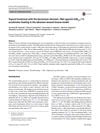 10 citations,
January 2016 in “Elsevier eBooks”
10 citations,
January 2016 in “Elsevier eBooks” Nanoparticles can speed up wound healing and deliver drugs effectively but may have potential toxicity risks.
 10 citations,
January 2009 in “Elsevier eBooks”
10 citations,
January 2009 in “Elsevier eBooks” Hair growth is influenced by hormones and goes through different phases; androgens can both promote and inhibit hair growth depending on the body area.
 9 citations,
January 2016 in “Skin Pharmacology and Physiology”
9 citations,
January 2016 in “Skin Pharmacology and Physiology” The study concluded that both estrogen and androgen receptors, which decrease with age, are linked to skin aging and may be hormonally regulated.
 8 citations,
January 2020 in “Skin Pharmacology and Physiology”
8 citations,
January 2020 in “Skin Pharmacology and Physiology” Caffeine improves hair growth, thickness, and reduces shedding.
 7 citations,
November 2022 in “Communications biology”
7 citations,
November 2022 in “Communications biology” Keratin injections can promote hair growth by affecting hair-forming cells and tissue development.
 5 citations,
January 2018 in “PubMed”
5 citations,
January 2018 in “PubMed” Biodegradable microneedle patches help topical steroids work better for prurigo nodularis.
 5 citations,
February 2013 in “Expert Review of Dermatology”
5 citations,
February 2013 in “Expert Review of Dermatology” New acne treatments include combination creams, advanced retinoids, and light therapies, focusing on safety and patient adherence.
 4 citations,
November 2012 in “Obstetrics, Gynaecology & Reproductive Medicine”
4 citations,
November 2012 in “Obstetrics, Gynaecology & Reproductive Medicine” Lifestyle changes and clomiphene are first-line treatments for infertility in women with PCOS, with other options available if these fail.
 4 citations,
October 2007 in “Dermatologic Clinics”
4 citations,
October 2007 in “Dermatologic Clinics” Glucocorticoids and sex hormones affect skin health, with potential for targeted treatments to minimize side effects and treat skin conditions.
 3 citations,
October 2018 in “Archives of Dermatological Research”
3 citations,
October 2018 in “Archives of Dermatological Research” Applying InlB321/15 to wounds sped up healing in mice.
 3 citations,
July 2017 in “Current sports medicine reports”
3 citations,
July 2017 in “Current sports medicine reports” Athletes can experience various skin issues, which can be treated and prevented with appropriate care and protective measures.
 2 citations,
July 2004 in “Proceedings of SPIE, the International Society for Optical Engineering/Proceedings of SPIE”
2 citations,
July 2004 in “Proceedings of SPIE, the International Society for Optical Engineering/Proceedings of SPIE” Near-infrared laser therapy with Indocyanine Green dye improves acne by reducing inflammation without side effects.
![Integrating Multi-Omics Analyses of Nonomuraea Dietziae to Reveal the Role of Soybean Oil in [(4′-OH)MeLeu]4-CsA Overproduction](/images/research/0eba9759-3aa4-4a06-a70a-2d9c46be53f3/small/23018.jpg) 1 citations,
July 2017 in “Microbial Cell Factories”
1 citations,
July 2017 in “Microbial Cell Factories” Adding soybean oil to Nonomuraea dietziae increases production of a beneficial compound by improving metabolism and enzyme systems.
 1 citations,
June 2012 in “Springer eBooks”
1 citations,
June 2012 in “Springer eBooks” Acupuncture may improve reproductive and metabolic functions in PCOS without negative side effects, but more research is needed to confirm its effectiveness.
 1 citations,
January 2015 in “Journal of Pigmentary Disorders”
1 citations,
January 2015 in “Journal of Pigmentary Disorders” Treating melasma in men is difficult, especially for the deeper skin layers, and may need more than just topical treatments.
 December 2023 in “bioRxiv (Cold Spring Harbor Laboratory)”
December 2023 in “bioRxiv (Cold Spring Harbor Laboratory)” Aged individuals heal wounds less effectively due to specific immune cell issues.
 May 2022 in “International Journal for Research in Applied Science and Engineering Technology”
May 2022 in “International Journal for Research in Applied Science and Engineering Technology” Iron supplements combined with Quilib lotion effectively treat hair loss in people with iron deficiency anemia.
 November 2020 in “Journal of The American Academy of Dermatology”
November 2020 in “Journal of The American Academy of Dermatology” Taking vitamin C and vitamin E twice a day can help prevent sunburn and DNA damage from UVB exposure.
 July 2018 in “Elsevier eBooks”
July 2018 in “Elsevier eBooks” Telogen Effluvium is a common, usually reversible hair loss condition, often improved by removing the trigger and possibly treated with various products, though their effectiveness is uncertain.
 April 2016 in “Plastic and reconstructive surgery. Global open”
April 2016 in “Plastic and reconstructive surgery. Global open” The supplement highlighted advancements and challenges in plastic and reconstructive surgery, including the impact of smoking, chemotherapy, and new treatments like Tafluprost for hair loss.
 May 2014 in “Transfusion and Apheresis Science”
May 2014 in “Transfusion and Apheresis Science” Multiple plasma donations do not change donors' biochemical parameters.
 434 citations,
October 2003 in “PTR. Phytotherapy research/Phytotherapy research”
434 citations,
October 2003 in “PTR. Phytotherapy research/Phytotherapy research” Natural products in cosmetics are beneficial for skin and hair care with low toxicity.
 264 citations,
January 2008 in “Journal of biomedical optics”
264 citations,
January 2008 in “Journal of biomedical optics” Zinc oxide nanoparticles in sunscreen do not penetrate deep into the skin.
 195 citations,
November 2019 in “Clinica Chimica Acta”
195 citations,
November 2019 in “Clinica Chimica Acta” High levels of male hormones, insulin resistance, and obesity are closely linked and worsen polycystic ovary syndrome, but more research is needed to improve treatments.
 195 citations,
January 2008 in “Photochemistry and Photobiology”
195 citations,
January 2008 in “Photochemistry and Photobiology” Visible light can damage skin and most sunscreens don't block it well; more research is needed on its effects and protection methods.
 174 citations,
April 2005 in “The American journal of pathology (Print)”
174 citations,
April 2005 in “The American journal of pathology (Print)” Capsaicin, found in chili peppers, can slow down hair growth by affecting skin cells and hair follicles.
 155 citations,
June 2009 in “International Journal of Dermatology”
155 citations,
June 2009 in “International Journal of Dermatology” Lichen planus is a skin condition that can resolve on its own, is linked to hepatitis C, and increases the risk of skin cancer.
 145 citations,
May 2008 in “Cancer Science”
145 citations,
May 2008 in “Cancer Science” Cancer cells often have more copies of TERT and TERC genes, which helps them grow and could affect patient outcomes.
 142 citations,
March 2019 in “Frontiers in Cellular Neuroscience”
142 citations,
March 2019 in “Frontiers in Cellular Neuroscience” The document concludes that adenosine receptor agonists have potential for treating various conditions, but only a few are approved due to challenges like side effects and the need for selective activation.
 137 citations,
June 2005 in “Climacteric”
137 citations,
June 2005 in “Climacteric” Estrogen loss during menopause worsens skin health, but hormone replacement therapy may improve it, though more research is needed.













![Integrating Multi-Omics Analyses of Nonomuraea Dietziae to Reveal the Role of Soybean Oil in [(4′-OH)MeLeu]4-CsA Overproduction](/images/research/0eba9759-3aa4-4a06-a70a-2d9c46be53f3/small/23018.jpg)
















